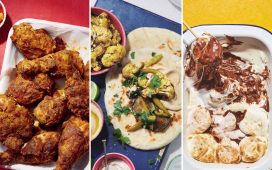Despite how much scientists have learned in recent years, there remains a lot that we still don’t know about the thousands of different microbial species that can inhabit the gut.
“The known unknowns of the microbiome are staggering: Approximately 20 percent of bacterial gene sequences have not been identified,” and the function of 40 percent of the estimated 10 million total of bacterial genes remains unknown, Dr. Loughman and a colleague wrote in a recent review paper published in The Lancet Gastroenterology & Hepatology.
Studies have shown that there is no one-size-fits-all diet that has consistent effects on such factors as metabolic health or weight loss for everyone, and the microbiome is part of the reason for this. As a result, some companies are combining microbiome analyses with other data to give people customized diet recommendations.
One large international study of personalized nutrition, called Predict, has followed 1,100 people in the United States and Britain, including hundreds of identical and nonidentical twins. It found that people can have dramatically different metabolic responses to the same foods and that unique factors, such as a person’s genetics, sleep, stress and exercise levels, and the diversity and types of microbes in their guts, all influence how they metabolize food.
This research formed the basis of a company called Zoe, which provides personalized food recommendations. To do that, the company analyzes its customers’ gut microbiomes and collects a wealth of other health data from them. Zoe has its customers wear continuous glucose monitors, and it takes blood samples from them to see how different meals affect the levels of fat and glucose in their circulations. Prices for the company’s programs start at $354, paid in six monthly installments of $59.
In 2015, a group of researchers at the Weizmann Institute of Science in Israel published a study involving 800 participants that also showed that people had wildly different glucose responses, an indicator of diabetes risk, to the same foods. The researchers developed an algorithm using data from the participants’ glucose responses, gut microbiomes, family histories and lifestyles, which allowed them to predict how a person’s glucose levels would respond to different foods. The research gave rise to a company called DayTwo, which provides personalized nutrition advice to people with diabetes to help them manage their condition.
Using the company’s app, customers can see if a meal they’re thinking of having is likely to spike their glucose levels, and they are guided toward food choices that might be better for them, said Eran Segal, a computer scientist at the Weizmann Institute and a co-founder of DayTwo. “We’ll almost never tell you that you can’t eat something,” said Dr. Segal. “But we’re going to tell you that we may change the quantity a bit or change the food combinations.”





